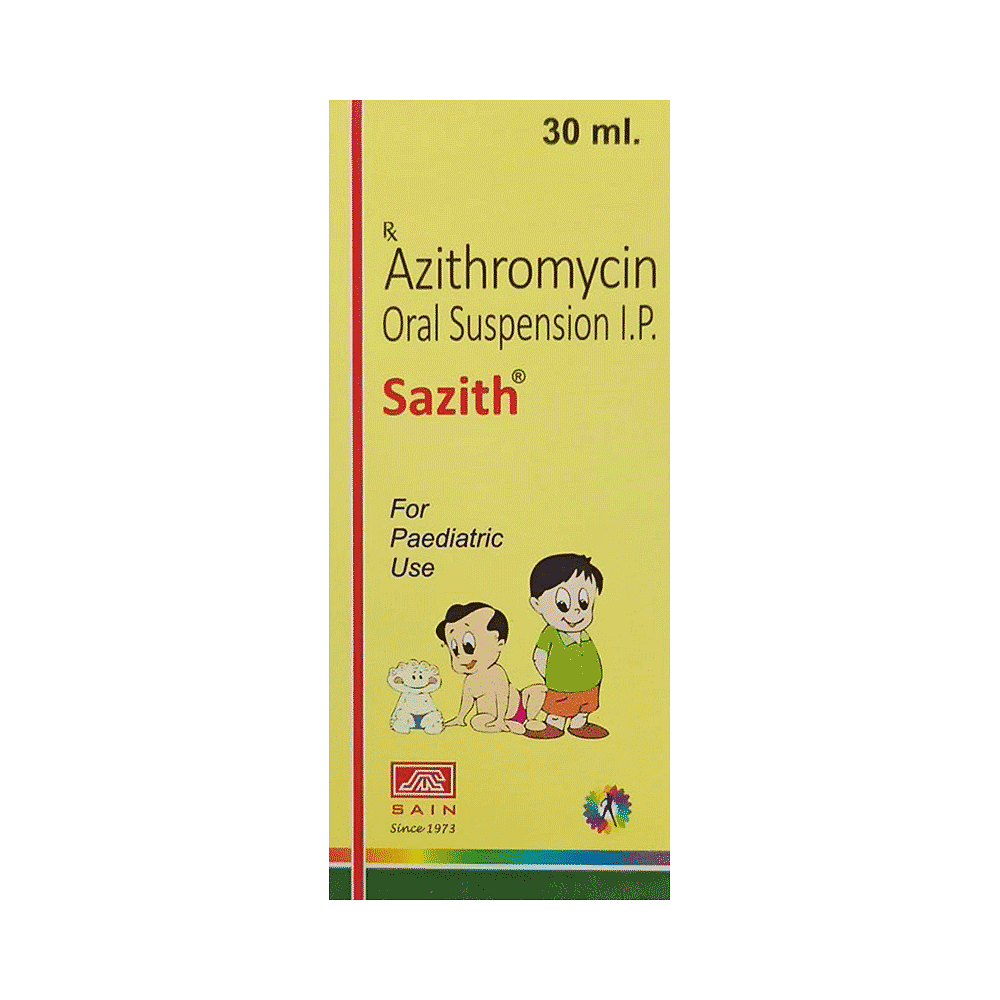
Azrocin Suspension
Manufacturer
Jayson Pharmaceuticals Ltd
Salt Composition
Azithromycin (100mg)
Key Information
Short Description
Azrocin Suspension is an antibiotic medication used to treat a wide range of bacterial infections in children.
Dosage Form
Suspension
Introduction
Azrocin Suspension is an antibiotic medication commonly given to children for the treatment of bacterial infections targeting the ear, eyes, nose, throat, lungs, skin, and gastrointestinal tract. It is essential to complete the entire course of this medicine to avoid the bacteria multiplying again or causing another infection.
Directions for Use
Give Azrocin Suspension with food to avoid an upset stomach. Encourage your child to drink plenty of water in case diarrhea develops as a side effect.
How it works
Azrocin Suspension is an antibiotic that works by interfering with the synthesis of essential proteins required by bacteria to perform important functions. It stops the infection-causing bacteria from growing further and prevents the infection from spreading.
Quick Tips
Complete the entire course of this medicine Give with food to avoid an upset stomach Encourage your child to drink plenty of water in case diarrhea develops Only give to your child for their current infection Stop the medicine and contact the doctor immediately if your child develops an itchy rash, facial swelling, and breathing difficulties soon after intake
Related Medicines

Sazith Suspension

Moazil Suspension

Azital Suspension

Orizee 100mg Suspension

Azisuper 100mg Suspension

Azizit 100mg Suspension

Azamra 100mg Suspension

Azel Suspension

Azithrot Suspension

Azitek 100mg Suspension
Frequently asked questions
What are the potential adverse effects of using Azrocin Suspension beyond a prescribed dosage?
Azrocin Suspension is generally considered safe when used as directed by your healthcare provider. However, exceeding the recommended dose could lead to unintended side effects such as nausea, vomiting, or diarrhea. If you believe you have exceeded the prescribed dosage, it's crucial to contact your doctor immediately.
What are some serious potential risks associated with Azrocin Suspension?
Serious adverse effects of Azrocin Suspension can include kidney damage, allergic reactions, severe gastrointestinal disturbances like persistent vomiting and diarrhea, and the development of opportunistic infections. It's important to immediately contact your doctor if you encounter any serious side effects.
Can I combine Azrocin Suspension with other medications at the same time?
It is essential to inform your healthcare provider about all medications, including over-the-counter products and supplements, before starting Azrocin Suspension. This will allow your doctor to assess potential interactions and advise on safe medication combinations.
Is it safe to get vaccinated alongside Azrocin Suspension?
In general, vaccines are not expected to cause negative reactions with Azrocin Suspension. However, children who are taking antibiotics should avoid vaccinations until their illness is resolved and they feel better.
Which lab tests should be conducted during long-term treatment with Azrocin Suspension?
Your healthcare provider may recommend periodic kidney function tests and liver function tests to monitor your child's condition while on treatment with Azrocin Suspension. These tests help assess the liver and kidneys’ function.
How does Azrocin Suspension affect digestion?
Children may experience digestive upset, including diarrhea, when taking any medicine, including antibiotics like Azrocin Suspension. Azrocin Suspension can disrupt the balance of bacteria in their gut, potentially increasing the risk of infections. If your child experiences diarrhoea, it is important not to stop the treatment course unless advised by a healthcare professional.
Can Azrocin Suspension impact my child’s immune system?
Azrocin Suspension is designed to target and eliminate specific bacteria. However, its use can disrupt the balance of bacteria in the gut, potentially making your child more susceptible to infections. It's crucial to monitor for any changes in your child's health during and after treatment.
Why is Azrocin Suspension prescribed for a specific duration?
The duration of Azrocin Suspension depends on the type of bacterial infection being treated and your child’s age. The recommended dose and schedule may vary depending on these factors.
What should I avoid while taking Azrocin Suspension?
It is generally advised to avoid antacids when taking Azrocin Suspension, as they might affect the medicine's effectiveness. Additionally, prolonged exposure to sunlight or tanning beds should be avoided as it can increase your child’s risk of sunburn.
Is Azrocin Suspension a strong antibiotic?
Azrocin Suspension is an effective antibiotic with a longer half-life than other antibiotics. It's designed to target specific bacteria and work for a short period, usually once per day.
Can Azrocin Suspension cause a yeast infection?
Some individuals may develop a fungal or yeast infection after taking Azrocin Suspension. This can happen due to the disruption of the balance of bacteria in the gut, which can increase the risk of yeast infections. If you experience any vaginal itching, discharge, or sores, it's crucial to inform your doctor immediately.


